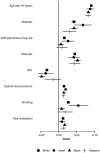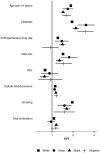Race/Ethnic Differences in the Associations of the Framingham Risk Factors with Carotid IMT and Cardiovascular Events
- PMID: 26134404
- PMCID: PMC4489855
- DOI: 10.1371/journal.pone.0132321
Race/Ethnic Differences in the Associations of the Framingham Risk Factors with Carotid IMT and Cardiovascular Events
Abstract
Background: Clinical manifestations and outcomes of atherosclerotic disease differ between ethnic groups. In addition, the prevalence of risk factors is substantially different. Primary prevention programs are based on data derived from almost exclusively White people. We investigated how race/ethnic differences modify the associations of established risk factors with atherosclerosis and cardiovascular events.
Methods: We used data from an ongoing individual participant meta-analysis involving 17 population-based cohorts worldwide. We selected 60,211 participants without cardiovascular disease at baseline with available data on ethnicity (White, Black, Asian or Hispanic). We generated a multivariable linear regression model containing risk factors and ethnicity predicting mean common carotid intima-media thickness (CIMT) and a multivariable Cox regression model predicting myocardial infarction or stroke. For each risk factor we assessed how the association with the preclinical and clinical measures of cardiovascular atherosclerotic disease was affected by ethnicity.
Results: Ethnicity appeared to significantly modify the associations between risk factors and CIMT and cardiovascular events. The association between age and CIMT was weaker in Blacks and Hispanics. Systolic blood pressure associated more strongly with CIMT in Asians. HDL cholesterol and smoking associated less with CIMT in Blacks. Furthermore, the association of age and total cholesterol levels with the occurrence of cardiovascular events differed between Blacks and Whites.
Conclusion: The magnitude of associations between risk factors and the presence of atherosclerotic disease differs between race/ethnic groups. These subtle, yet significant differences provide insight in the etiology of cardiovascular disease among race/ethnic groups. These insights aid the race/ethnic-specific implementation of primary prevention.
Conflict of interest statement
Figures


References
-
- Alwan A. Global status report on noncommunicable diseases 2010. Geneva, Switzerland: World Health Organization; 2011.
-
- World Health Organization. World Health Statistics 2012. Chemistry & Geneva, Switzerland; 2012.
-
- Kannel WB, McGee D, Gordon T. A general cardiovascular risk profile: the Framingham Study. Am J Cardiol. 1976;38: 46–51. - PubMed
-
- Conroy RM, Pyörälä K, Fitzgerald AP, Sans S, Menotti A, De Backer G, et al. Estimation of ten-year risk of fatal cardiovascular disease in Europe: the SCORE project. Eur Heart J. 2003;24: 987–1003. - PubMed
-
- Tillin T, Hughes AD, Whincup P, Mayet J, Sattar N, McKeigue PM, et al. Ethnicity and prediction of cardiovascular disease: performance of QRISK2 and Framingham scores in a U.K. tri-ethnic prospective cohort study (SABRE—Southall And Brent REvisited). Heart. 2014;100: 60–7. 10.1136/heartjnl-2013-304474 - DOI - PMC - PubMed
Publication types
MeSH terms
Substances
Grants and funding
- N01 HC085080/HL/NHLBI NIH HHS/United States
- N01 HC085082/HL/NHLBI NIH HHS/United States
- N01 HC095159/HL/NHLBI NIH HHS/United States
- N01 HC055222/HL/NHLBI NIH HHS/United States
- N01 HC085079/HL/NHLBI NIH HHS/United States
- HHSN268200800007C/HL/NHLBI NIH HHS/United States
- HHSN268201200036C/HL/NHLBI NIH HHS/United States
- N01 HC085081/HL/NHLBI NIH HHS/United States
- N01-HC-95167/HC/NHLBI NIH HHS/United States
- HHSN268200800007C/HL/NHLBI NIH HHS/United States
- N01 HC085086/HL/NHLBI NIH HHS/United States
- N01 HC085083/HL/NHLBI NIH HHS/United States
- N01-HC-95159/HC/NHLBI NIH HHS/United States
- N01 HC095167/HL/NHLBI NIH HHS/United States
- HHSN268201200036C/HL/NHLBI NIH HHS/United States
- MR/M006638/1/MRC_/Medical Research Council/United Kingdom
LinkOut - more resources
Full Text Sources
Other Literature Sources
Medical

